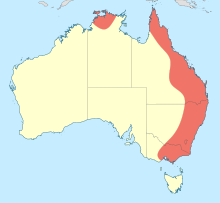Hemigomphus
Hemigomphus is a genus of dragonflies in the family Gomphidae,[2] endemic to Australia.[3] The species are small with black and yellow markings.[3][4] They are commonly known as vicetails.
| Hemigomphus | |
|---|---|
.jpg) | |
| Male Hemigomphus gouldii | |
| Scientific classification | |
| Kingdom: | Animalia |
| Phylum: | Arthropoda |
| Class: | Insecta |
| Order: | Odonata |
| Infraorder: | Anisoptera |
| Family: | Gomphidae |
| Genus: | Hemigomphus Selys, 1854[1] |
 | |
Species
The genus Hemigomphus includes the following species:[2][5]
- Hemigomphus atratus Watson, 1991 - black vicetail
- Hemigomphus comitatus (Tillyard, 1909) - zebra vicetail
- Hemigomphus cooloola Watson, 1969 - Wallum vicetail
- Hemigomphus gouldii (Selys, 1854) - southern vicetail
- Hemigomphus heteroclytus Selys, 1854 - stout vicetail
- Hemigomphus magela Watson, 1991 - Kakadu vicetail
- Hemigomphus theischingeri Watson, 1991 - rainforest vicetail
gollark: What?
gollark: It's possible but unlikely.
gollark: What?
gollark: u
gollark: `mkfs.xfs /dev/sda`
See also
References
| Wikimedia Commons has media related to Hemigomphus. |
| Wikispecies has information related to Hemigomphus |
- Selys-Longchamps, E. (1854). "Synopsis des Gomphines". Bulletin de la Classe des Science, Académie Royale de Belgique (in French). 21 (7): 23–112 [66] – via Biodiversity Heritage Library.
- "Genus Hemigomphus Selys, 1954". Australian Faunal Directory. Australian Biological Resources Study. 2012. Retrieved 20 February 2017.
- Theischinger, Günther; Hawking, John (2006). The Complete Field Guide to Dragonflies of Australia. Collingwood, Victoria, Australia: CSIRO Publishing. p. 188. ISBN 978 0 64309 073 6.
- Watson, J.A.L.; Theischinger, G.; Abbey, H.M. (1991). The Australian Dragonflies: A Guide to the Identification, Distributions and Habitats of Australian Odonata. Melbourne: CSIRO. p. 278. ISBN 0643051368.
- Schorr, Martin; Paulson, Dennis. "World Odonata List". Slater Museum of Natural History. University of Puget Sound. Retrieved 20 February 2017.
This article is issued from Wikipedia. The text is licensed under Creative Commons - Attribution - Sharealike. Additional terms may apply for the media files.